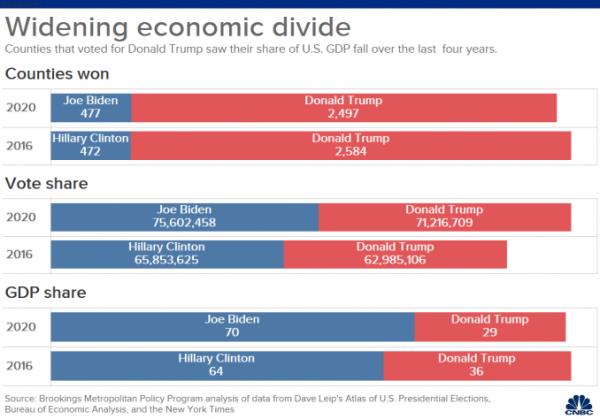Trump 的根据地:“穷得叮当响”!

美国政治冲突的根基不是政策,而是谁拥有美国。
Many see the election politics from the angle of policy or personality. I like to view it in a more fundamental way. The underlying conflict in the US politics is not in policy (both parties always swing back to the center after elections), but rather in who really own America. Traditionally white Americans like to think the U.S. is their country and thus always feel entitled to the privileges that they have been enjoying. But the competitions from both within and without the country have taken many of those privileges away from a substantial portion of those white Americans. Within the country: Non-white Americans, the Jews, the blacks, the Asians, the Latinos, and whatever new immigrants, are now given more and more, and often equal, rights as the whites. They compete against the whites for education, job, and housing. Some of the whites lost in these competitions and shrink away, moving into rural areas, far away from the booming digital and world economy. Internationally, the Asians are competing hard and are wining, first came the Japanese, then the Koreans, the Taiwanese, and now the Chinese, Vietnamese, and even the Indians. Cars, electronics, and even software (Tiktok, WeChat are so good that we have to ban them since we could not compete against them). The most shocking realization to me is that Intel, the pinnacle of most advanced high-tech manufacturing, has lost in the competition against Taiwan Semiconductor Company. The whites can be roughly separated into two groups, the winners and the losers in these competitions. The winners tend to welcome and be more open to the competition, and also more Democratic leaning. The losers try to go back to the good old days -- Make America Great Again. What time do they want to take America back to? The slavery system or the Chinatown days? That kind of America will not come back again. The rich and wealthy states are along the coasts, full of immigrants and Democratic leaning population. With money in hands, they are moving inland, essentially to buy the land and homes now occupied by those who have lost in the competitions. The speed of change in economic powers between these two groups is shocking in the last ten years, both in GPD and in median household income (see figure above). The divide of blue and red is like the divide of the north and south in Lincoln's day, separating two different economies, and the outcome of this conflict is essentially a foregone conclusion. I am not celebrating this trend. It is so sad so many people have lost the ways of life that they always enjoyed in the good old days and now have to learn a new way of life, and have to compete against so many new competitors. Rather, I am trying to remind myself, and my kids: try to get on the fast-moving train, instead of standing in front of it.
|
